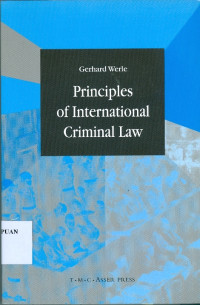
Text
Principles of international criminal law
The book analyzes the Rome statue of the International Criminal Court as well as customary international law, and deals extensively with the case law of the ICTY and ICTR and of various national courts. With the establishment of numerous international and mixed tribunals in recent years, international criminal law has gained unprecedented importance and continues to expand tremendously. This systematic analysis of substantive international criminal law examines its general principles, sources and evolution as well as specific international crimes, providing an in-depth analysis of the Rome Statute of the International Criminal Court (ICC) and customary international law. The updated second edition takes account of the emerging case law of the ICC and other international and national courts in the field. It includes more recent methods of enforcing international criminal law, such as hybrid tribunals, and contains a new separate chapter on implementation. International Criminal Law [ICL] contains a number of general principles, which form the foundations of and conditions for holding individuals criminally responsible for crimes under international law (genocide, crimes against humanity, war crimes, and the crime of aggression), and other crimes against the peace and security of mankind. Most general principles of ICL have been adequately implemented in the current (second) edition of the Criminal Code of the Republic of Kazakhstan. This paper assesses the quality of and identifies the lacunae in the implementation of Kazakhstan’s Criminal Code, with a view to suggesting further improvements to this Code.
Availability
| KP.III.000194 | KP.III.WER p | My Library | Available |
Detail Information
- Series Title
-
-
- Call Number
-
KP.III WER p
- Publisher
- The Hague : TMC Asser., 2005
- Collation
-
xxii, 485 hal; 24 cm
- Language
-
English
- ISBN/ISSN
-
9067042021
- Classification
-
KP.III
- Content Type
-
-
- Media Type
-
-
- Carrier Type
-
-
- Edition
-
-
- Subject(s)
- Specific Detail Info
-
-
- Statement of Responsibility
-
-
Other version/related
No other version available
File Attachment
Comments
You must be logged in to post a comment
 Computer Science, Information & General Works
Computer Science, Information & General Works  Philosophy & Psychology
Philosophy & Psychology  Religion
Religion  Social Sciences
Social Sciences  Language
Language  Pure Science
Pure Science  Applied Sciences
Applied Sciences  Art & Recreation
Art & Recreation  Literature
Literature  History & Geography
History & Geography